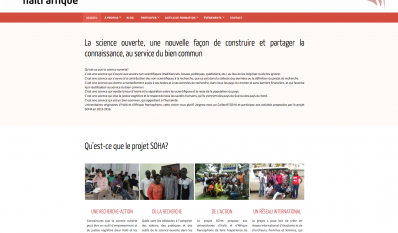Who?
The researchers Diéyi Diouf and Florence Piron initiated the SOHA project that was launched for a two-year period, from January 2015 to December 2016. It promotes open science as an essential tool for increasing the visibility of scientific work of Francophone Africa and Haiti researchers; therefore its tar-get audience is the academic community.
What & How?
Dissemination consists of several different activities ranging from YouTube videos, newsletters, and scientific events to online training courses, interviews and surveys. The dissemination objects are texts, data and video. The outputs are a network of emerging science shops, a dedicated blog, scientific publications and datasets. However, the most important achievement is the consolidation of an international academic community, students, male and female researchers around the concept of cognitive justice.
When?
Dissemination activities started in the early stage of the project with two online surveys and interviews to people involved in the project. During the analysis phase results of questionnaires were available on the website and blog. Researchers were invited to publish their scientific works in open access, with the support of a publishing house: Éditions science et bien commun.
Relation to Open Science
The SOHA project is released under a Creative Commons Attribution (CC BY) license. All outcomes of the project can be freely used by academics, students and researchers generating new knowledge and turning them into new products. It is difficult to define a link between project publications and peer review. Concerning metrics, impact indicators are: number of views for videos, number of downloads for publications in Zenodo as well as project mentions by blogs, tweets, and Facebook pages.
Effort
The project is created and managed by an academic team and all dissemination materials are produced by academics and university students. The project is founded by the International Development Research Centre (IDRC) and the total budget amounts to 80,176.00 CAD$, i.e. about 50.000 Euro.
Impact
The SOHA project is an action project and according to this vocation, it develops a set of actions. These actions include a first survey that received 878 responses in 18 countries, a second one launched in May 2016, four international symposia on open science and cognitive justice, creative journals in Burundi and Niger, a platform for African open access scientific journals, an open book publishing house, etc.
Summing up, the project completely achieved its two aims: a better understanding of the context and importance of open science and an enhancement of the visibility of Francophone Africa and Haiti scientific community. At the moment the project is concluded, but to promote further tangible activities, several members of SOHA created an association called APSOHA that will take over the SOHA project.
Gender
The project was directed by two women. In general, the SOHA project paid special attention to emphasizing the contribution of women in research activities and in the development of open access in the project dissemination material. This is evident in the use of language and images. Concerning language use, masculine and feminine grammatical genders are used (e.g. chercheurs et chercheures, conseillers et conseillères). In the images male and female are equally represented and they are portrayed also in the same position and situation. These two elements are very important in gender-sensitive communication.
Highlight
|
||
|---|---|---|
|
Science Shops are not "shops" in the traditional sense of the word. They are small entities which provide independent, participatory research support to civil society. Science Shops are often linked to universities where students, under the supervision of a professor, perform the research. Students usually get credit points, counting towards their degrees, for their research. The criteria that most science shops apply are that clients must have no commercial aim with the research, and the research results must become public. |
||
Link
For a more extensive analysis of the SOHA case study, please follow the link: http://openup-h2020.eu/wp-content/uploads/2017/01/OpenUP_D4.1_Practices-evaluation-and-mapping.-Methods-tools-and-user-needs.pdf





